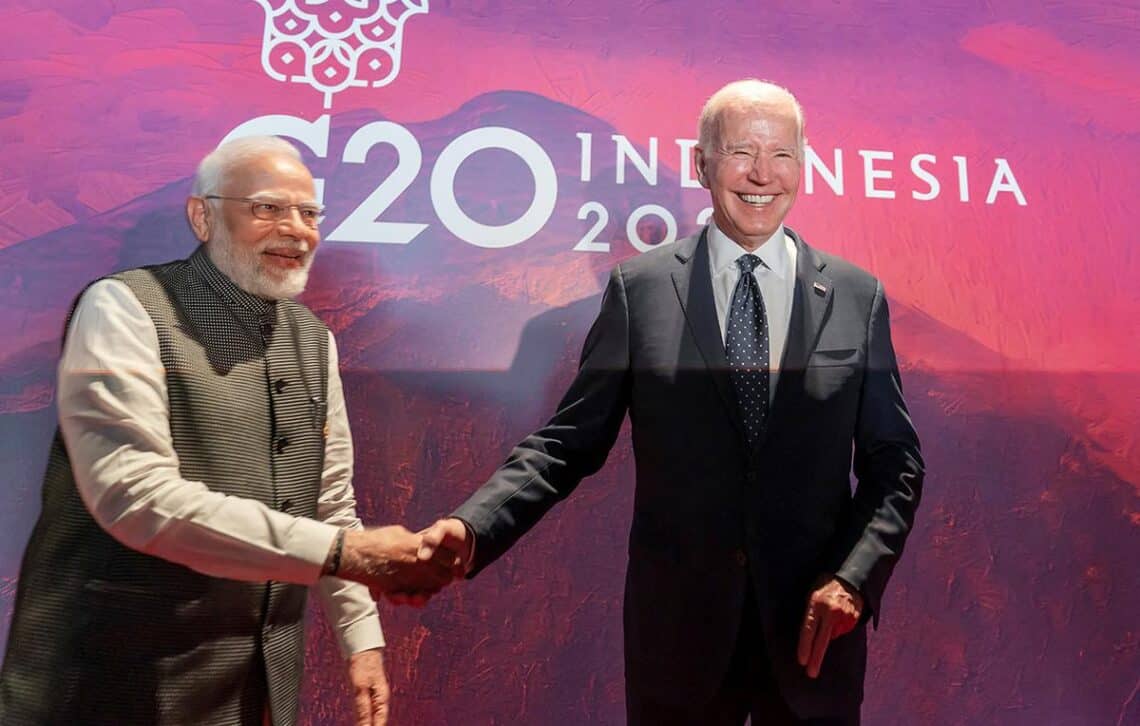[ad_1]

President Joe Biden, right, shakes hands with Prime Minister Narendra Modi. File.
| Photo Credit: Reuters
Criticising the U.S. State Department’s comparison of immunity given to Prime Minister Narendra Modi since 2014 with the legal immunity now given to Saudi Crown Prince and Prime Minister Mohammed bin Salman, the government on Thursday said the U.S. comments were not “relevant, necessary or contextual”.
The Ministry of External Affairs also took aim at the U.S. Commission on International Religious Freedom (USCIRF) for issuing a “Country Update” that accused the government of “engaging in or tolerating systematic, ongoing, and egregious religious freedom violations”.
Speaking about a report that said Mr. Modi had hoped to travel to the U.S. for a State Visit in December this year, the MEA spokesperson said the government had made no such proposal. He also said that Mr. Modi and U.S. President Joe Biden had met on a “number of occasions” during the recent G-20 summit in Bali, including a “brief bilateral meeting” and a trilateral meeting with Indonesian President Joko Widodo.
“We have seen the biased and inaccurate observations about India by the USCIRF. Their tendency to consistently misrepresent facts shows a lack of understanding of India, its constitutional framework, plurality and robust democratic system,” said MEA spokesperson Arindam Bagchi, when asked about the update issued by the Congressional body that had already issued an annual report and other documents expressing concern over human rights and religious freedom in India earlier this year.
The “Country Update”, released on November 22, had included recent incidents and government actions that it called a “crackdown on civil society and dissent”, pointing to the imprisonment and harassment of “journalists, lawyers, rights activists, academics, political leaders, religious minorities, and others critical of its policies”. It also said that the government’s actions have “eroded the secular principles of the Indian Constitution and India’s pluralistic democracy by promoting and implementing its Hindutva ideology through government policy”, and recommended that the U.S. State department, which periodically releases a list of countries being watched for religious freedom issues, to designate India as a Country of Particular Concern (CPC).
The MEA spokesperson said the government had not protested about the USCIRF report with the U.S. Embassy or government, as the USCIRF is a U.S. Congressional body, not a government one. In 2005, Mr. Modi, the then Gujarat Chief Minister had been put on a U.S. visa ban under the 1998 U.S. International Religious Freedom Act (IRFA), after a recommendation from the USCIRF that had criticised his role in the 2002 Gujarat riots.
Mr. Bagchi also expressed surprise at a recent comment by U.S. State Department spokesperson Vedant Patel on November 18 on the issue of the U.S. visa ban. Mr. Patel had said, in response to a number of questions from the U.S. press corps over the Biden administration’s decision to give Saudi Prince Mohammed immunity in the Jamal Khashoggi murder case, given his new role as head of the Saudi government, that the U.S. has given similiar immunity to Mr. Modi and a number of other leaders like former Zimbabwean President Robert Mugabe, former Congolese President Laurent Kabila and former Haitian President Jean-Bertrand Aristide. “I fail to understand how [the State Department’s] comment on PM Modi was either necessary, relevant or contextual. Our two countries enjoy a very special relationship that is going from strength to strength, and we look forward to deepening it,” he said.
[ad_2]












